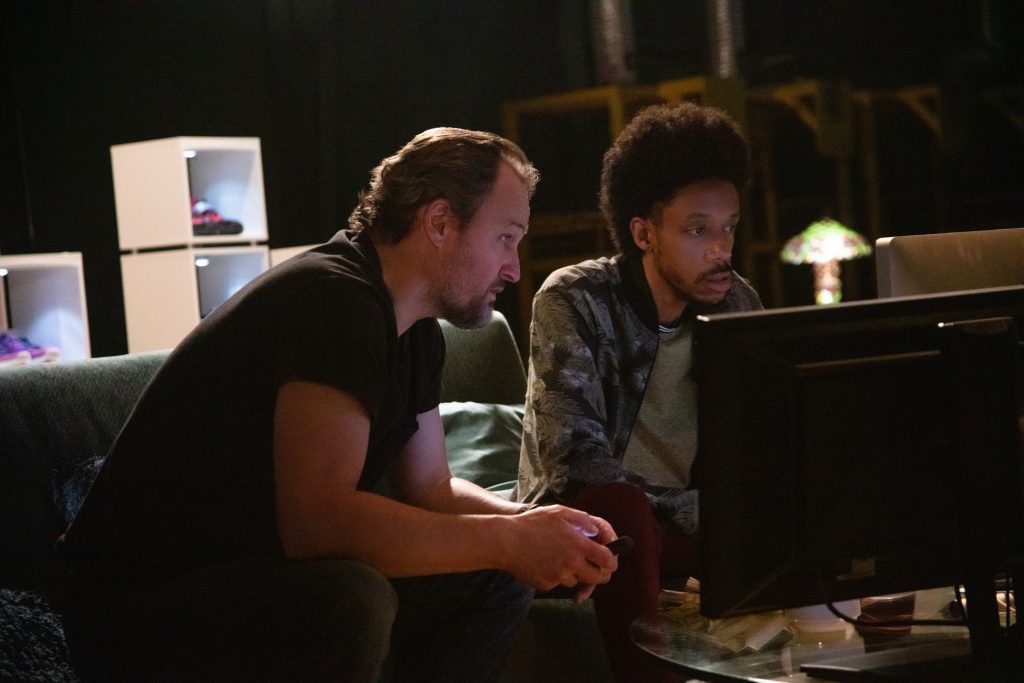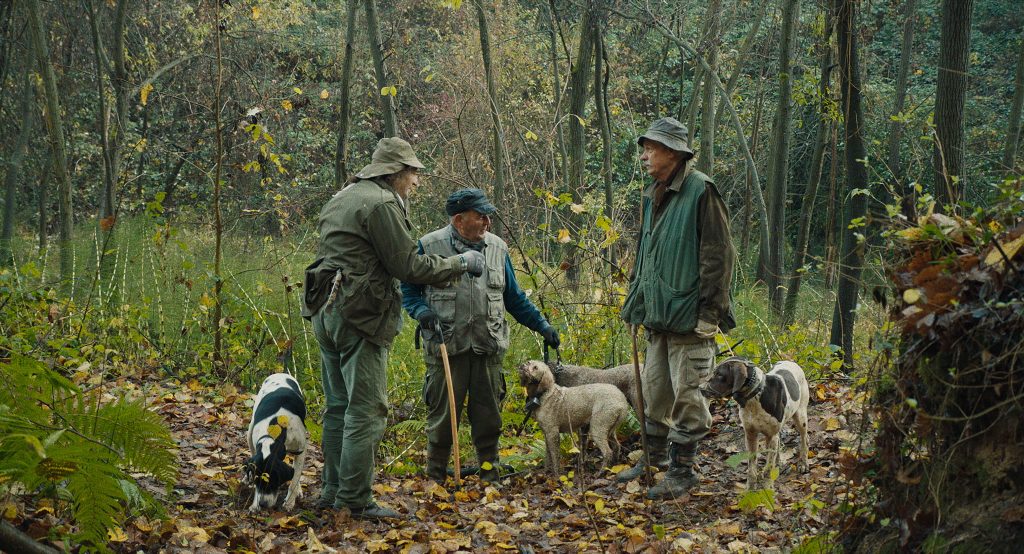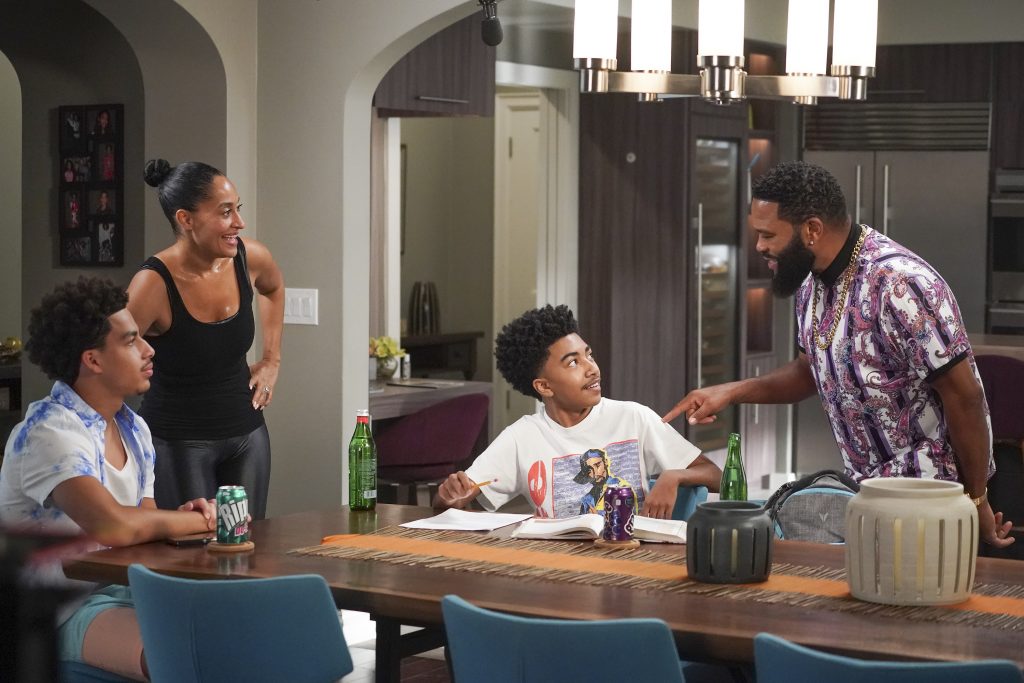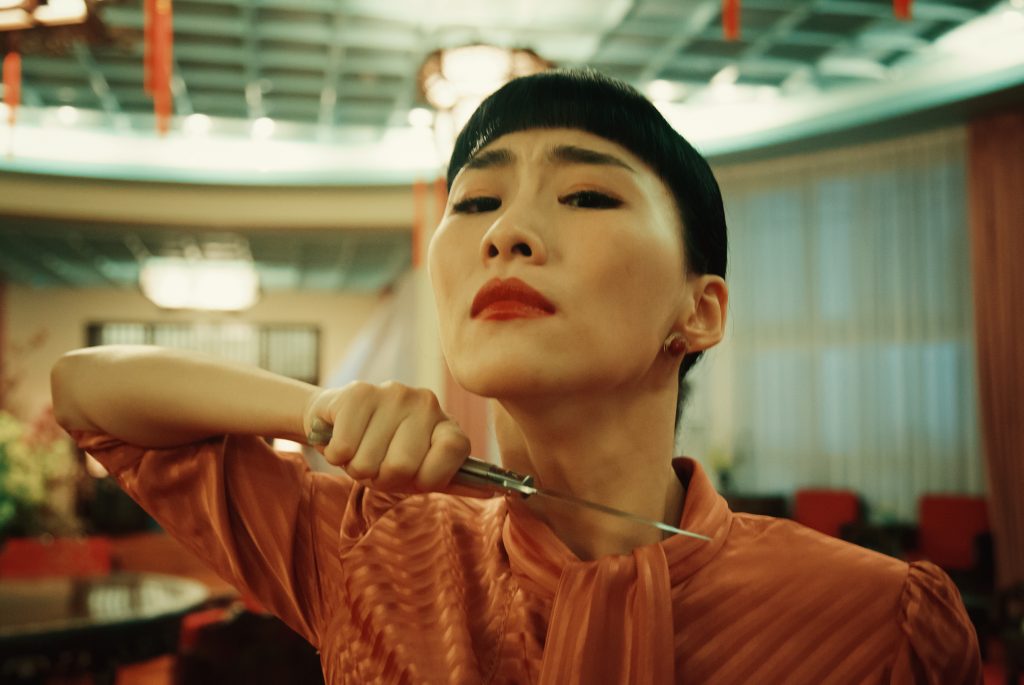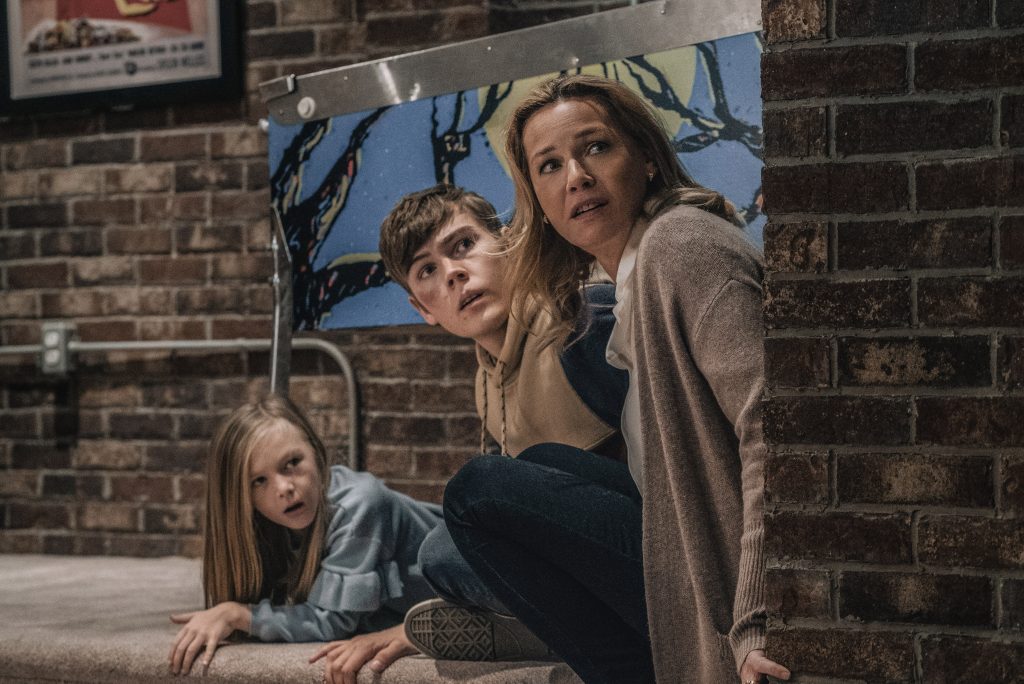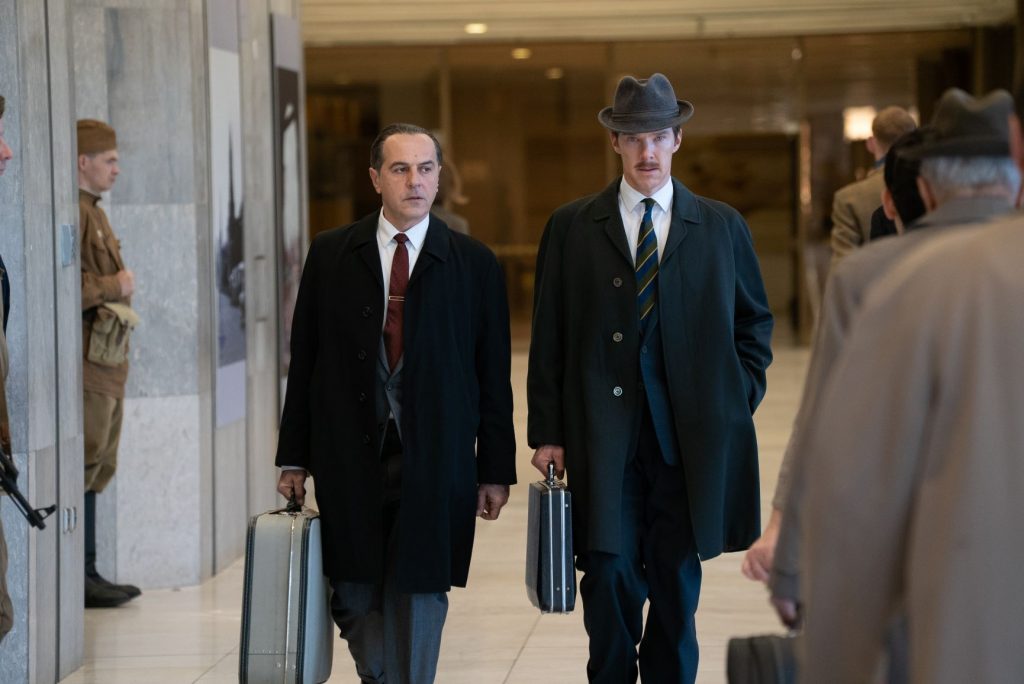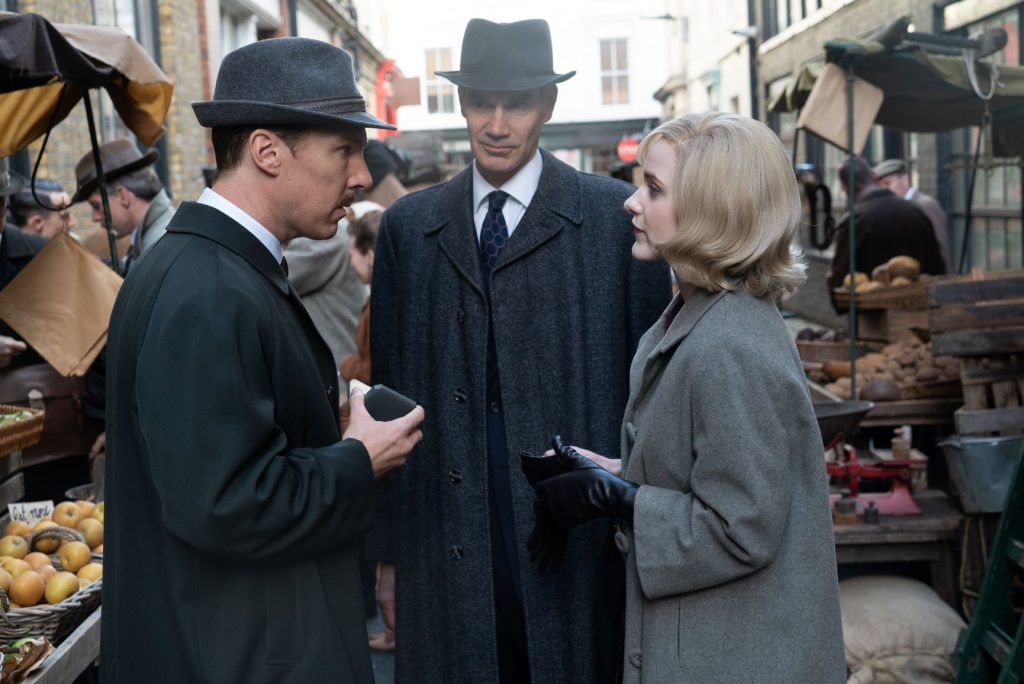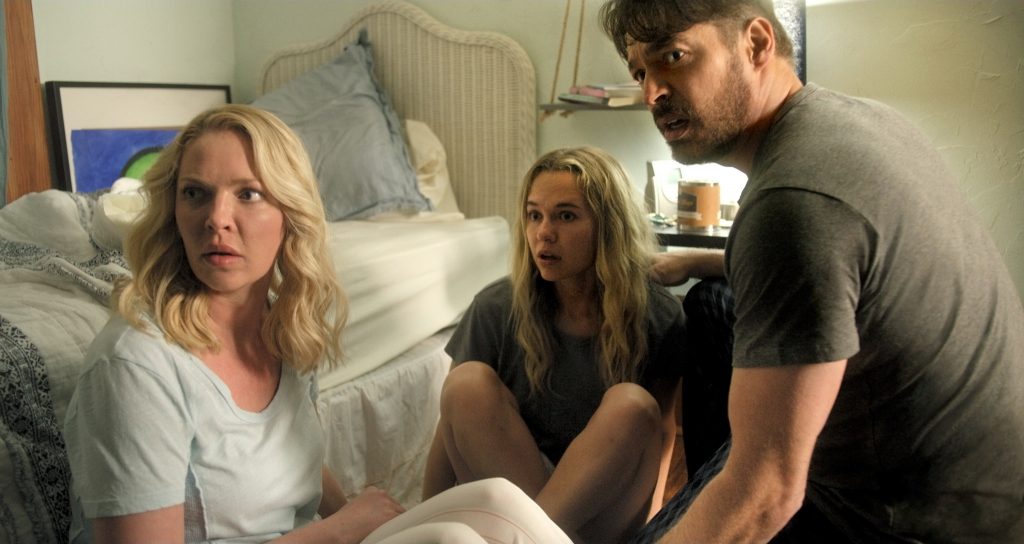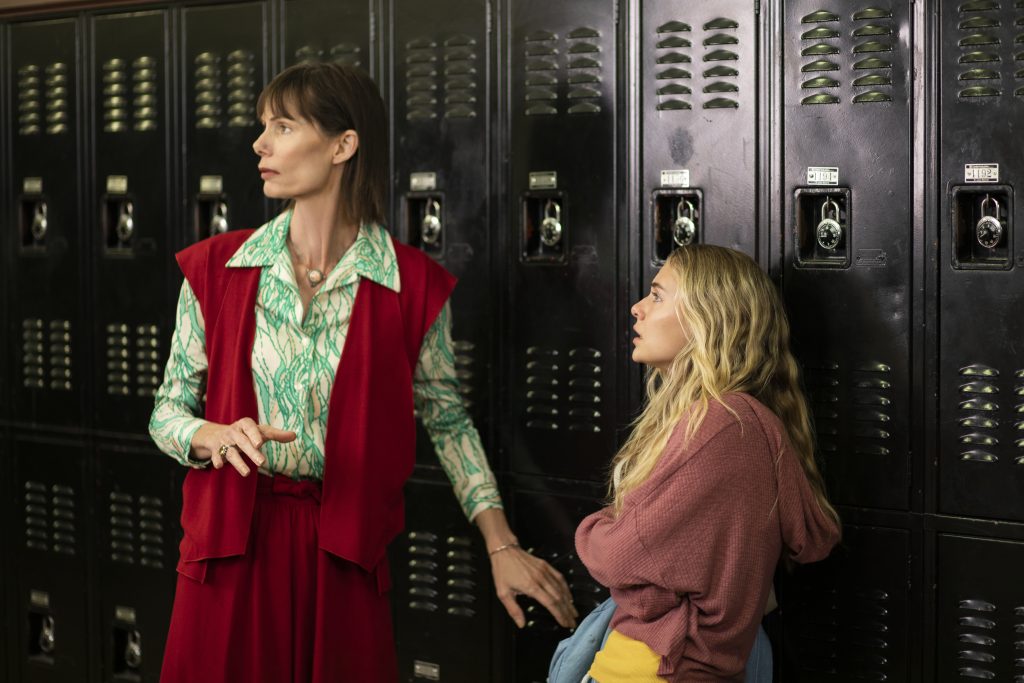March 31, 2021
by Carla Hay

Directed by Nick Sasso
Culture Representation: Taking place in New York City, Los Angeles, Greece, Thailand and Mexico City, the dramatic film “Haymaker” features a predominantly white cast (with some Latinos, African, Americans and Asians) representing people in the entertainment industry and the world of Muay Thai fighting.
Culture Clash: A Muay Thai fighter becomes the bodyguard of an up-and-coming singer and gets more than he bargained for when he starts to have romantic feelings about her.
Culture Audience: “Haymaker” will appeal primarily to people who don’t mind watching a movie that’s a series of tedious scenes that don’t add up to much of a plot.

The dramatic film “Haymaker” is a globe-trotting film that had the potential to be a compelling adventure/love story. However, the movie’s incoherent storyline, badly written dialogue and dull acting make it very forgettable. “Haymaker” is the feature-film directorial debut of Nick Sasso, who is also the star of the film as the story’s protagonist. But his Nicky “Mitts” Malloy character is so lacking in charisma that he is easily outshined by co-star Nomi Ruiz, who plays the seductive singer (also named Nomi) who steals Nicky’s heart.
In “Haymaker,” Nicky is a retired championship Muay Thai fighter who is now working as a bouncer/security staffer at a New York City nightclub. It’s the type of nightclub where young people like to party but some shady criminal types hang out there too. In the beginning of the movie, Nicky sees Nomi being sexually assaulted in the dressing room by a thug named Bluto (played by Olan Montgomery) before she goes on stage.
Nicky comes to Nomi’s rescue by beating up her attacker, who leaves the club. There’s no mention in the movie of calling the police to report this sexual assault because it’s implied that this is the type of nightclub that doesn’t want the cops anywhere near the place. Nomi, who is a dance/pop artist, thanks Nicky, manages to compose herself, and she performs on stage like a pro.
Nicky is transfixed and awed, as he watches Nomi perform while he stands near the bar. He looks at her in a way that it’s pretty obvious that these two are going to be headed toward a romance at some point in the story. Ruiz is a pretty good singer/performer, but the songs she does in “Haymaker” are very generic.
After the nightclub closes for the night, Nomi says to Nicky while they’re seated at the bar: “You know, I owe you a drink.” Nicky replies, “No, you don’t.” Nomi then says, “I could use one.” This is an example of the simplistic and boring dialogue that drags down the film. The actors also sometimes recite their lines awkwardly, with pauses that are little too long and pacing that doesn’t sound like an authentic conversation.
Because Nomi was impressed with how Nicky fought to protect her, she offers him a job as her bodyguard. Nomi says she needs protection from “her fans,” but her half-joking tone of voice when she says it will make people wonder if she’s serious or not. Nicky is going to need this bodyguard job, because shortly after he and Nomi have the conversation, he gets fired by his boss Javier (played by John Ventimiglia) at the nightclub.
Javier tells Nicky that the firing is nothing personal against Nicky, but it’s because Bluto is “a friend of the club,” and the boss can’t risk alienating this thug. The implication is that Bluto is some kind of gangster or shady person who’s given this nightclub boss a reason to choose Bluto over Nicky. Now that he’s been laid off from the nightclub, Nicky can spend more time being Nomi’s full-time bodyguard. How convenient.
Nicky and Nomi have a conversation outside of the nightclub where they both talk a little bit about their backgrounds. They’re both New York City natives. He’s from The Bronx, while she’s from Bay Ridge in Brooklyn.
Nomi tells Nicky that he’s also going to be her driver because she doesn’t have a car. Nicky doesn’t even bother to charge her extra money for this added responsibility. It’s pretty obvious that he’s infatuated with her and he thinks getting paid to be around Nomi is just a bonus. Nicky and Nomi exchange phone numbers and then part ways for the night.
The first time that Nicky goes to work for Nomi, she wants him to drive her to a recording studio. He picks her up at her modest apartment, where Nomi lives with her bed-ridden grandmother, whom she calls Mama (played by Kathryn Kates). While at the apartment, Nicky and Nomi talk some more about their lives. They both find out that they have something in common: They were both expelled from high school.
Nicky is the “strong, silent type,” so even though viewers can see that he’s probably falling for Nomi, he doesn’t really outwardly express it. In terms of personality, Nicky and Nomi are opposites (he’s an introvert, she’s an extrovert) and have very different lifestyles. Nomi is a bit of a wild child who likes to party (she does cocaine and Ecstasy in a few scenes), while Nicky seems to be leading a fairly straight-laced lifestyle.
Nomi is unpredictable and sometimes irrational, as Nicky finds out when he takes her to the recording studio. She orders Nicky to wait for her in the reception area until she completes her recording session. But then, a rapper named Logan (played by Ty Hickson) in the recording studio picks a fight with Nomi, so the recording session is cut short.
Nicky has no way of knowing about this argument because he’s in another part of the building and couldn’t hear what was going on. But that doesn’t stop Nomi from storming out of the studio and berating Nicky for not coming to her rescue. Nicky tells Nomi that she’s being unreasonable, but she makes it clear that she gets to decide what Nicky should be doing because she’s paying him. Nomi seems to be treating Nicky like a chump, so this movie will have a hard time convincing viewers that this would-be romance is built on mutual respect.
One of the biggest flaws in “Haymaker” is that it constantly hints of an intriguing backstory for Nomi, but then just leaves those hints hanging with no elaboration. For example, one night, Nicky goes back to the nightclub where he used to work. He happens to see Nomi at the club. She’s sitting at a table with a mobster type named Fürst (played by Udo Kier, who has a brief cameo) and two couples who appear to be part of Fürst’s entourage.
Nicky joins them at the table, but he looks and feels uncomfortable. Fürst talks about how Nomi burned down his Malibu house, but it was an accident. Fürst then tells Nomi in a slightly menacing voice, “You owe me.” After Nomi snorts some cocaine, Nicky escorts her out of the nightclub. Fürst is never seen or heard from again. It’s never revealed in the movie how Nomi and Fürst know each other, what she was doing in Malibu, and what she “owes” him.
And the movie hints at but never explores the fact that Nomi is a transgender woman, as is Ruiz in real life. There’s a scene that’s in the “Haymaker” trailer where she reveals to Nicky that she’s transgender, but that scene was cut from the movie. In the scene, Nicky and Nomi are in someone’s home while he looks at several framed family photos displayed on a table. He picks up a photo of a little boy and asks who the boy is. Nomi replies, “Me.”
Nomi says a few things in the movie that give hints about her transgender identity, by telling Nicky that she can’t really reveal all of herself to him and that she’s not who she appears to be. However, since the filmmakers cut out the scene of Nomi telling Nicky that she lived as a boy when she was a child, the movie doesn’t have a big reveal about Nomi being transgender.
Because Nicky is never told in the final cut of the movie that Nomi is transgender, this omission can be considered careless at best or deliberately dishonest at worst. Maybe the filmmakers didn’t want Nomi’s transgender identity to be a distraction to the story. Or maybe they feared that it would alienate transphobic viewers. Whatever the reason, muting or possibly trying to erase Nomi’s transgender identity was a missed opportunity to make this very tedious movie more interesting.
There’s another part of the movie where Nicky briefly meets Nomi’s mother Marisol (Veronica Falcón), and it’s hinted that Nomi and Marisol were estranged at some point. It’s also implied that Nomi spent a great deal of her childhood being raised by her grandmother. But the movie never goes into details over why Nomi was closer to her grandmother than she was to her mother.
Not much is told about Nicky’s background either. He has an older brother named Mack (played by D.B. Sweeney), who has been his trainer. And during a conversation between Nicky and Nomi, Nicky mentions that he had a fiancée, who was his co-worker, but the fiancée broke up with Nicky after he lost a fight. Nicky describes the breakup this way to Nomi: “She was cool. I hurt her feelings. The end.”
Even though it’s never said out loud in the film, and it’s not spoiler information, viewers can easily figure out the ex-fiancée is a woman named Rosie (played by Zoë Bell), who works at a gym where Nicky did a lot of training. Rosie’s brief interactions with Nicky give the impression that they used to be romantically involved and they’re now trying to keep things professional, but Rosie still cares about him as a friend. Nicky seems to have some hard feelings about the breakup though, because he’s a little bit standoffish toward Rosie.
A lot of “Haymaker” is a mishmash of scenes of Nicky going on tour with Nomi in various places, such as Los Angeles, Greece and Mexico City. She’s well-known enough to headline at large nightclubs that hold about 1,000 people, but she’s definitely not very famous. People watching this movie should be prepared to see a lot of scenes of Nicky literally standing around while he watches Nomi perform on stage, or else he’s lingering in the background while she parties in hotel rooms or nightclubs and he barely talks to anyone.
A major problem with “Haymaker” is that the filmmakers seemed more concerned with filming the actors in exotic settings than making this story interesting. Nomi actually doesn’t have anyone in her life who’s a real threat to her, so the supposed “protection” she needs is a very misleading part of this movie. Don’t expect “Haymaker” to be like an indie film version of the 1992 Whitney Houston/Kevin Costner blockbuster “The Bodyguard.” There are no chase scenes, stalkers or assassination attempts in “Haymaker.”
As for the romance in “Haymaker,” it might have been intended as a “slow burn,” but it’s more like a “big snooze.” Because the dialogue is so dumbed-down, Nicky and Nomi don’t have any meaningful conversations that would make it believable that they’re connecting on a level that goes beyond physical attraction. The movie also doesn’t adequately address how Nomi takes advantage of the power imbalance that she has as Nicky’s employer.
Some very cliché jealousy issues happen between Nicky and Nomi. At one point in “Haymaker,” Nicky comes out of Muy Thai retirement, trains in Thailand, and does a Muy Thai fight with Brett “The Threat” Hlavacek, who portrays himself in the movie. But even the fight scenes and the outcome of the fight are formulaic and extremely predictable.
For a low-budget independent movie, “Haymaker” makes an admirable attempt to look stylish, since many of Nomi’s performance scenes and the outdoor vistas benefit from cinematography that tries to make the movie look more glamorous than it really is. “Haymaker” also has a few light touches of comedy, such as a scene where Nomi wants to spend time at a beach, but Nicky doesn’t have a swimsuit. They go into a public restroom and she makes him wear the type of swimsuit he doesn’t like: a Speedo.
Ultimately though, “Haymaker” is too disjointed with its poorly conceived screenwriting, amateurish directing and choppy editing. No one is expecting the Nicky character to be a talkative intellectual (look at “Rocky” movie hero Rocky Balboa, for instance), but viewers expect a leading man to at least have something magnetic about his personality. Unfortunately, between Nicky’s dullness and Nomi not doing much except pouting, singing and acting sexy, “Haymaker” is just a disappointing dud. The movie might have been filmed in various locations around the world, but “Haymaker” ends up going nowhere if people are looking for a quality story that’s entertaining.
Kamikaze Dogfight and Gravitas Ventures released “Haymaker” in select U.S. cinemas, on digital and VOD on January 29, 2021.




